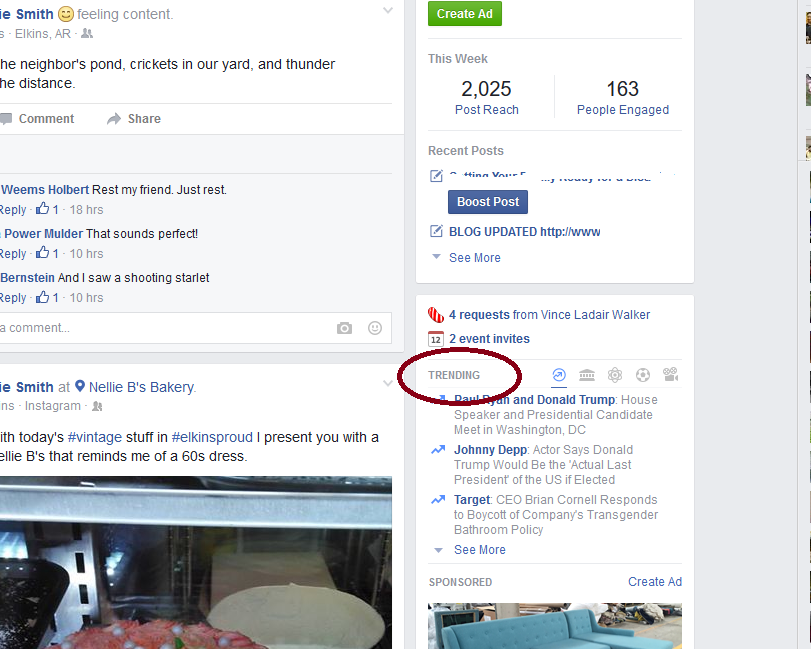Your cart is currently empty!

Congress Takes on Facebook
Facebook has become an important news source for millions of Americans. They’re not a traditional news source, certainly, except insofar as Facebook has taken the place of gossiping around the water cooler or over the fence. But traditional news sources post at Facebook, and an anonymously-sourced report at Gizmodo claims that news curators there showed bias in the way that they curated the news.
There is a “Trending” box on Facebook, you see. I don’t use it, and many of my friends were unaware of its existence, but when I heard that Congress was upset about it, I went and looked. It’s on the right hand side, higher or lower depending whether you have pages that you manage. You can see it in the screenshot above if you, like me, have never paid any attention to it. This is the area that Gizmodo was talking about in its exciting exposé claiming that the stories in that little box aren’t always the most popular topics. Sometimes the news curators pick and choose from among the top-ranking stories. As though they were human beings capable of making judgements about what would most appeal to their audience, or something.
Somehow, Congress heard about this report at Gizmodo and they were shocked — shocked — to learn that there is bias in news sources, and that social media platforms aren’t immune from bias.
“In other words,” Gizmodo’s report says, “Facebook’s news section operates like a traditional newsroom, reflecting the biases of its workers and the institutional imperatives of the corporation.”
Senator Thune of South Dakota sent a letter to Mark Zuckerberg asking a number of multi-part questions about its Trending Topics, and calling on Facebook to explain themselves to Congress, specifically to the US Senate Commerce Committee.
I object to this, frankly. First, because freedom of the press is part of our constitution, and insofar as Facebook is part of the press, they shouldn’t have to answer to Congress. If they’re not part of the press, then they should be covered by freedom of speech and perhaps freedom of assembly, and no matter how you look at it, they have a right to list their choice of Greatest Hits on their website.
Second, I object to our legislators wasting their time on this when they continue to be one of the least productive Congresses in history. They can’t get it together to come up with help for the 3.5 million U.S. citizens of Puerto Rico who are currently seeing their schools, public healthcare, and emergency responders cut in order to satisfy hedge fund investors, but they can take time to complain that Facebook didn’t put Mitt Romney in a box as often as they would have liked?
That’s my personal objection.
But as creators and consumers on the web, we should all be objecting to this. We know that Facebook adjusts its algorithm to make sure that businesses have to pay to show up on the timeline of their fans. They favor behavior that encourages people to make new friends. They show fewer videos to people with slower connections. They show us things our friends like more often than other things. In fact, they tailor newsfeeds to suit the preferences of readers and to further their own business goals. They get to do this because they are a business, a publisher, not a public utility. They also get to curate their news any way they see fit. So do the rest of us publishers.
Future Tense suggests that Facebook is a monopoly, in effect a public utility, and that perhaps it should be regulated or at least that the government should encourage competition from other companies (Google +, anyone?). They point out that Facebook’s Terms of Use, not the constitution, actually govern what we see on our timelines, and that we agreed to those terms of use at some point in our Facebook lives.
Social media is controlled primarily by users. We get to pick what we see, either by clicking or by other aspects of our online behavior. That is as it should be. I’d like to see us all pay more different points of view rather than always being shown things I (and all my friends) already agree with, but that’s my personal preference. Senator Thune’s desire to see more conservative news is his preference, and he can control his social media feeds to favor his political views. I don’t want him to control my social media experience to favor his personal preferences.
The internet has allowed a new democratization of information. It has leveled the playing field for business, dropped the bar to entry for entrepreneurs, and opened new opportunities for learning, communication, and service. The Congress has real problems to address.
by
Tags:

Leave a Reply